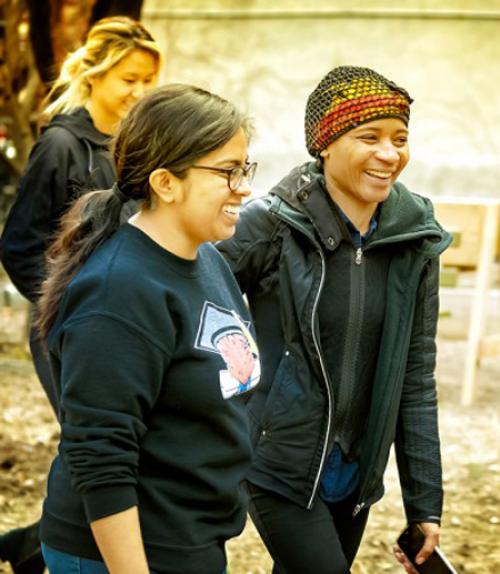Engaged Cornell’s spirit grows in the colleges, schools and other campus units, such as the Community Learning and Service Partnership, Cornell in Washington, the Center for Teaching Innovation, Cornell Abroad, the Cornell Public Service Center, The Cornell Commitment collection of programs, the Cornell Prison Education Program, the Office of Academic Diversity Initiatives, the Office of Engagement Initiatives and more.
A few examples:
- The High Road Fellowships in Buffalo, New York, is an ILR School program (not limited to ILR students) that embeds about 20 students each summer in engaged learning and applied research in community-based economic development organizations in Buffalo. The partnerships create hands-on experiences in grassroots economic development, urban revitalization, poverty alleviation, public economic policy, labor-community alliances and more.
- Landscape architecture students in the College of Agriculture and Life Sciences who are enrolled in the Climate-Adaptive Design studio, in partnership with the Cornell Water Resources Institute and the New York State Department of Environmental Conservation’s Hudson River Estuary Program, travel to flood-prone Hudson Valley communities each semester. They create climate-resilient designs to offer protection from rising water levels associated with climate change.
- In a new food justice class in the College of Arts and Sciences – Race and Social Entrepreneurship: Food Justice and Urban Reform – students work with residents of senior living communities in Ithaca to conduct research on food insecurity and discuss issues of food policy, politics, access and sustainability. The course was supported through an Engaged Curriculum Grant and by associate professor Noliwe Rooks, who developed the course further during her time as an Engaged Faculty Fellow.
- A new biological and environmental engineering and entrepreneurship course, Learning the Professional Practice of Entrepreneurship by Being an Entrepreneur, engages engineers with an SOS Children’s Village for abandoned or otherwise traumatized children in Puerto Varas, Chile. The goal is to create a functioning aquaponics system to produce vegetables and fish. Using engineering expertise and developing knowledge in finance, marketing, management and cross-culture communication, the students help the village become more self-sufficient by expanding its aquaponics operation to generate an ongoing revenue stream.
- “Root Map” is a collaborative, living play about borders and migration that travels to different communities for theatrical and story-building workshops. An international collaboration between the College of Arts and Sciences and Jadavpur University in Kolkata, India, the play interweaves stories from different cultures to explore the similarities people experience when encountering borders.
To see more examples, and to keep up with community engagement at Cornell, visit cornell.edu/engagement.




